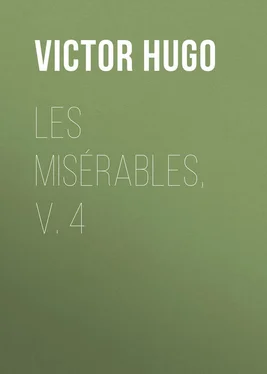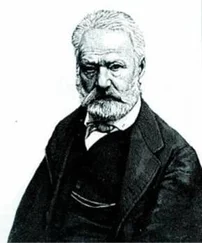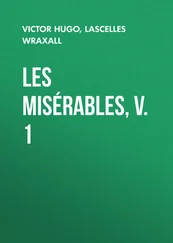Victor Hugo - Les Misérables, v. 4
Здесь есть возможность читать онлайн «Victor Hugo - Les Misérables, v. 4» — ознакомительный отрывок электронной книги совершенно бесплатно, а после прочтения отрывка купить полную версию. В некоторых случаях можно слушать аудио, скачать через торрент в формате fb2 и присутствует краткое содержание. Жанр: literature_19, foreign_antique, foreign_prose, на английском языке. Описание произведения, (предисловие) а так же отзывы посетителей доступны на портале библиотеки ЛибКат.
- Название:Les Misérables, v. 4
- Автор:
- Жанр:
- Год:неизвестен
- ISBN:нет данных
- Рейтинг книги:4 / 5. Голосов: 1
-
Избранное:Добавить в избранное
- Отзывы:
-
Ваша оценка:
- 80
- 1
- 2
- 3
- 4
- 5
Les Misérables, v. 4: краткое содержание, описание и аннотация
Предлагаем к чтению аннотацию, описание, краткое содержание или предисловие (зависит от того, что написал сам автор книги «Les Misérables, v. 4»). Если вы не нашли необходимую информацию о книге — напишите в комментариях, мы постараемся отыскать её.
Les Misérables, v. 4 — читать онлайн ознакомительный отрывок
Ниже представлен текст книги, разбитый по страницам. Система сохранения места последней прочитанной страницы, позволяет с удобством читать онлайн бесплатно книгу «Les Misérables, v. 4», без необходимости каждый раз заново искать на чём Вы остановились. Поставьте закладку, и сможете в любой момент перейти на страницу, на которой закончили чтение.
Интервал:
Закладка:
Enjolras, while walking toward the meeting-place, took a mental review of the situation. The gravity of the events was visible, for when the facts which are the forerunners of latent social disease move heavily, the slightest complication checks and impedes their action. It is a phenomenon from which collapse and regeneration issue. Enjolras caught a glimpse of a luminous upheaving behind the dark clouds of the future. Who knew whether the moment might not be at hand when the people would seize their rights once again? What a splendid spectacle! the revolution majestically taking possession of France once more, and saying to the world, "To be continued to-morrow!" Enjolras was satisfied, for the furnace was aglow, and he had at that self-same moment a gunpowder train of friends scattered over Paris. He mentally compared Combeferre's philosophic and penetrating eloquence, Feuilly's cosmopolitan enthusiasm, Courfeyrac's humor, Bahorel's laugh, Jean Prouvaire's melancholy, Joly's learning, and Bossuet's sarcasms, to a species of electrical flash, which produced fire everywhere simultaneously. All were at work, and most certainly the result would respond to the effort. That was good, and it made him think of Grantaire. "Ah," he said to himself, "the Barrière du Maine is hardly at all out of my way, so suppose I go on to Richefeu's and see what Grantaire is doing, and how far he has got."
It was striking one by the Vaugirard church when Enjolras reached Richefeu's. He pushed open the door, went in, folded his arms, and looked about the room, which was full of tables, men, and tobacco smoke. A voice was audible in this fog, sharply interrupted by another voice, – it was Grantaire talking with some opponent of his. Grantaire was seated opposite another man, at a marble table covered with sawdust and studded with dominoes. He smote the marble with his fist, and this is what Enjolras heard: —
"Double six."
"A four."
"The pig! I haven't any left."
"You are dead. A two."
"A six."
"A three."
"An ace."
"My set."
"Four points."
"With difficulty."
"It is yours."
"I made an enormous mistake."
"You are getting on all right."
"Fifteen."
"Seven more."
"That makes me twenty-two [pensively]. Twenty-two!"
"You did not expect the double six. Had I played it at first it would have changed the whole game."
"Double two."
"An ace."
"An ace! well, a five!"
"I haven't one."
"You played first, I believe?"
"Yes."
"A blank."
"What luck he has! Ah! you have luck; [a long reverie] a two."
"An ace."
"I've neither a five nor an ace. It is stupid for you."
"Domino!"
"Oh, the deuce!"
BOOK II
ÉPONINE
CHAPTER I
THE LARK'S FIELD
Marius witnessed the unexpected dénouement of the snare upon whose track he had placed Javert, but the Inspector had scarce left the house, taking his prisoners with him in three hackney coaches, ere Marius stepped out of the house in his turn. It was only nine in the evening, and Marius went to call on Courfeyrac, who was no longer the imperturbable inhabitant of the Pays Latin. He had gone to live in the Rue de la Verrière, "for political reasons;" and this district was one of those in which insurrectionists of the day were fond of installing themselves. Marius said to Courfeyrac, "I am going to sleep here," and Courfeyrac pulled off one of his two mattresses, laid it on the ground, and said, "There you are!" At seven o'clock the next morning Marius returned to No. 50-52, paid his quarter's rent, and what he owed to Mame Bougon, had his books, bed, table, chest-of-drawers, and two chairs, placed on a truck, and went away without leaving his address; so that, when Javert returned in the morning to question Marius about the events of the previous evening, he only found Mame Bougon, who said to him, "Gone away." Mame Bougon was convinced that Marius was in some way an accomplice of the robbers arrested the previous evening. "Who would have thought it!" she exclaimed to the portresses of the quarter, "a young man whom you might have taken for a girl!"
Marius had two reasons for moving so promptly, the first was that he now felt a horror of this house, in which he had seen so closely, and in all its most repulsive and ferocious development, a social ugliness more frightful still, perhaps, than the wicked rich man, – the wicked poor man. The second was that he did not wish to figure at the trial, – which would in all probability ensue, – and be obliged to give evidence against Thénardier. Javert believed that the young man, whose name he forgot, had been frightened and had run away, or else had not even returned home; he made some efforts, however, to find him, which were unsuccessful. A month elapsed, then another. Marius was still living with Courfeyrac, and had learned from a young barrister, an habitual walker of the Salle des Pas Perdus, that Thénardier was in solitary confinement, and every Monday he left a five-franc piece for him at the wicket of La Force. Marius, having no money left, borrowed the five francs of Courfeyrac; it was the first time in his life that he borrowed money. These periodical five francs were a double enigma for Courfeyrac who gave them, and for Thénardier who received them. "Where can they go to?" Courfeyrac thought. "Where can they come from?" Thénardier asked himself.
Marius, however, was heart-broken, for everything had disappeared again through a trap-door. He saw nothing ahead of him, and his life was once more plunged into the mystery in which he had been groping. He had seen again momentarily and very closely the girl whom he loved, the old man who appeared her father, – the strange beings who were his only interest and sole hope in this world, – and at the moment when he fancied that he should grasp them, a breath had carried off all these shadows. Not a spark of certainty and truth had flashed even from that most terrific collision, and no conjecture was possible. He no longer knew the name of which he had felt so certain, and it certainly was not Ursule, and the Lark was a nickname; and then, what must he think of the old man? Did he really hide himself from the police? The white-haired workman whom Marius had met in the vicinity of the Invalides reverted to his mind, and it now became probable that this workman and M. Leblanc were one and the same. He disguised himself then, and this man had his heroic side and his equivocal side. Why did he not call for help? why did he fly? was he, yes or no, the father of the girl? and, lastly, was he really the man whom Thénardier fancied he recognized? Thénardier might have been mistaken. These were all so many insoluble problems. All this, it is true, in no way lessened the angelic charm of the maiden of the Luxembourg. Poignant distress, – Marius had a passion in his heart, and night over his eyes. He was impelled, he was attracted, and he could not stir; all had vanished, except love, and he had lost the sudden instincts and illuminations of even that love. Usually, this flame which burns us enlightens us a little, and casts some useful light without, but Marius no longer even heard the dumb counsel of passion. He never said to himself, Suppose I were to go there, or try this thing or the other? She whom he could no longer call Ursule was evidently somewhere, but nothing advised Marius in what direction he should seek her. All his life was now summed up in two words, – absolute uncertainty, in an impenetrable fog, – and though he still longed to see her, he no longer hoped it. As a climax, want returned, and he felt its icy breath close to him and behind him. In all these torments, and for a long time, he had discontinued his work, and nothing is more dangerous than discontinued work; for it is a habit which a man loses, – a habit easy to give up, but difficult to re-acquire.
Читать дальшеИнтервал:
Закладка:
Похожие книги на «Les Misérables, v. 4»
Представляем Вашему вниманию похожие книги на «Les Misérables, v. 4» списком для выбора. Мы отобрали схожую по названию и смыслу литературу в надежде предоставить читателям больше вариантов отыскать новые, интересные, ещё непрочитанные произведения.
Обсуждение, отзывы о книге «Les Misérables, v. 4» и просто собственные мнения читателей. Оставьте ваши комментарии, напишите, что Вы думаете о произведении, его смысле или главных героях. Укажите что конкретно понравилось, а что нет, и почему Вы так считаете.












